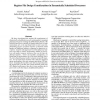Free Online Productivity Tools
i2Speak
i2Symbol
i2OCR
iTex2Img
iWeb2Print
iWeb2Shot
i2Type
iPdf2Split
iPdf2Merge
i2Bopomofo
i2Arabic
i2Style
i2Image
i2PDF
iLatex2Rtf
Sci2ools
152
click to vote
HPCA
1996
IEEE
1996
IEEE
Register File Design Considerations in Dynamically Scheduled Processors
We have investigated the register file requirements of dynamically scheduled processors using register renaming and dispatch queues running the SPEC92 benchmarks. We looked at processors capable of issuing either four or eight instructions per cycle and found that in most cases implementing precise exceptions requires a relatively small number of additional registers compared to imprecise exceptions. Systems with aggressive non-blocking load support were able to achieve performance similar to processors with perfect memory systems at the cost of some additional registers. Given our machine assumptions, we found that the performance of a four-issue machine with a 32-entry dispatch queue tends to saturate around 80 registers. For an eight-issue machine with a 64-entry dispatch queue performance does not saturate until about 128 registers. Assuming the machine cycle time is proportional to the register file cycle time, the 8-issue machine yields only 20% higher performance than the 4-iss...
Related Content
| Added | 07 Aug 2010 |
| Updated | 07 Aug 2010 |
| Type | Conference |
| Year | 1996 |
| Where | HPCA |
| Authors | Keith I. Farkas, Norman P. Jouppi, Paul Chow |
Comments (0)

